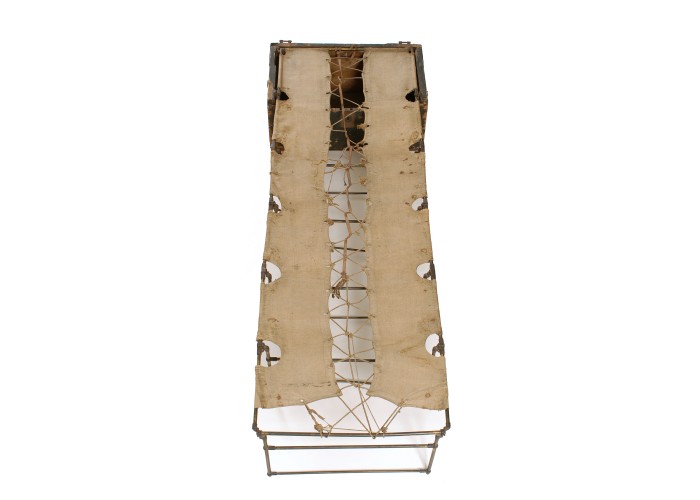Camp Bed
This is a folding camp (or “campaign”) bed together with its packing box. It was used by a Scottish officer who fought in the British wars against Napoleon, including Waterloo, and then by his grandson, campaigning in Egypt over sixty years later.
Officers in the British Army were responsible for buying their uniforms and equipment and were allowed to take a large amount of baggage on campaign. They expected to campaign like gentlemen, and their fellow officers expected them to do so. Needless to say, most officers were wealthy men who could afford this expensive lifestyle.
This bed belonged to Lieutenant J. Malcom of the 42nd (Royal Highland) Regiment of Foot (the Black Watch). He used it during the Peninsular War (1808-14) and the Waterloo campaign. His grandson, also of the Black Watch, used it during the Egyptian campaign of 1882, where the same cost, responsibilities and expectations continued.
The furniture was designed to be light and portable, hence the tubular frame. However, the more portable camp furniture became the more of it officers were able to take. In his diary of 1813 written during the Peninsular campaign Lieutenant Colonel William Tomkins of the Dragoon Guards explained:
“My equipment may appear a large fit-out for a person going on service, but experience taught us that campaign after campaign was not to be got through without the things that I have stated; and the more an officer makes himself comfortable, the better he will do his duty.”
His baggage weighed 600 pounds (over 270 kilos) and took two mules to carry it.
Meanwhile the common soldier marched and fought in full dress and carried all the arms, ammunition and clothing equipment issued to him, any personal possessions he might have as well as any special tools, utensils or supplies deemed vital to an operation by the staff. There were no baggage trains or forwarding depots for him.
His typical load was in the region of 60 to 80 lbs or 30 kilos, much the same as the full kit load of a modern infantry soldier. Kit checks were frequent and most soldiers would tolerate the weight of the gear rather than risk the severe physical punishments, frequently flogging, for disposing of some of it.
-
Curatorial info
- Originating Museum: The Black Watch Museum
- Production Date: c.1812
- Material: Leather, iron, canvas
-
Use this image
You can download a higher resolution image below, but please note the conditions of the licence.
- Rights Holder: Copyright The Black Watch Museum
- License Type: All Rights Reserved
Find it here
This object is in the collection of The Black Watch Castle and Museum








